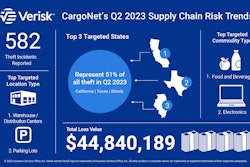Uber Freight on Friday announced on Thursday a host of upgrades to the freight platform that, among other things, should help to stamp out freight fraud and annoying detention times at shippers, according to CEO Lior Ron.
Ron discussed a series of updates made to the network, which he said includes more than 5,000 shippers and two million truck owners and drivers, after the company's big presentation to shippers. The updates read like fairly standard tech talk to big businesses: An "Insights AI" tool to surface relevant data to decision makers; a new procurement platform for shippers to speed up the bidding process, even on freight that's not on the network; and finally an "Uberized" transportation management software suite.
Basically, fancy new tech tools for shippers. What does it mean to the average owner-operator or small fleet?
Essentially, carriers may get the long-desired "Yelp for shippers" feature that everyone from individual owner-operators to scientists testifying to Congress have called for.
The Insights AI tool, aimed at decision makers at big shippers, will track every part of a load's movement, and tell the shipper if anything goes wrong or takes too long.
"Hey, shipper, this one facility is 4.1 stars because you suck, you don't have a bathroom and the gate takes 15 minutes instead of five minutes," Lior Ron gave as a somewhat informal summary of what the AI tool might tell a shipper. "This is the kind of analysis and coordination" shippers can't, or won't, do on their own, he said.

For any trucker who's ever had a bad experience detained at a shipper, the idea of getting that complaint straight to the top of the organization may appeal. Indeed, that's Uber Freight's pitch to the small carriers of the world.
"Once they're in the ecosystem, once we have GPS tracking on them with the TMS side, we have the ability to connect the TMS with the appointments set with the carrier to track when appointments are consumed, if there's a late arrival or late pickup, and to expand an appointment window," said Ron, who called it a "game changer. The pitch is for [carriers] to participate in our digital ecosystem and be able to engage to reduce detention time."
He added that "we can reduce like half" of empty miles with carriers working the system, too.
Ron said the company hoped to help Uber Freight's "beloved small and mid-sized fleets" with a number of the changes.
One such example comes in the form of the TMS, which through automation can now open up bid processes at huge shippers to fleets of any size.
"A mega shipper with a big freight auction, they don't have the time, effort, money or staff to deal with small fleets and medium-sized fleets'" bids, he said. Now, the automated tool should "democratize procurement" processes on the platform.
[Related: Direct freight: Delivering a modicum of consistency in a turbulent market]
Finally, on the hot-button topic of freight fraud, something fellow brokers like Convoy and Transifx (and load boards like DAT's and Truckstop's) have recently announced steps to combat, Ron said to expect better of Uber Freight.
"It's been top of mind for everyone," said Ron. "We spend a lot of time talking about fraud and double brokering with the shipper community. We've taken steps and made a big investment over the last nine months, since last year when some of the theft rings in SoCal started, to become the safest marketplace for carriers and shippers."
This included "re-honing our carrier selection and how we examine and curate the carrier base we're working with," he said.
Those tools "really look at any fraud signals in the system, things that suggest carriers we should pay more attention to and investigate to see if there's anything we can do."
In the past, anti-fraud crusaders like Dale Prax and Matthew Patrick have suggested seeminlgy simple ways to weed out bad-actor carriers, like checking for real physical addresses or multiple MC numbers. In theory, sophisticated tech measures could aide in the process. Both Prax and Patrick pointed to frustration with load boards and digital brokers' marketplaces not taking action on flagged accounts, but Ron said Uber Freight was different.
[Related: Inside the fight against cyber crime in brokered-freight networks]
Ron did not share any concrete statistics, but did say that "we do have market benchmarks on average fraud, and we are well below the fraud rate given all the measures we've taken."
Overdrive spoke to one hauler, Patrick Mashburn, who had accepted loads off of Uber Freight in the past, and he said "it's pretty easy to navigate through, and I haven't seen anything suspicious." That's one driver's opinion, at least.
Which load board or broker's digital marketplace takes freight fraud most seriously, and how do they go about it? Email [email protected] with any commentary.









